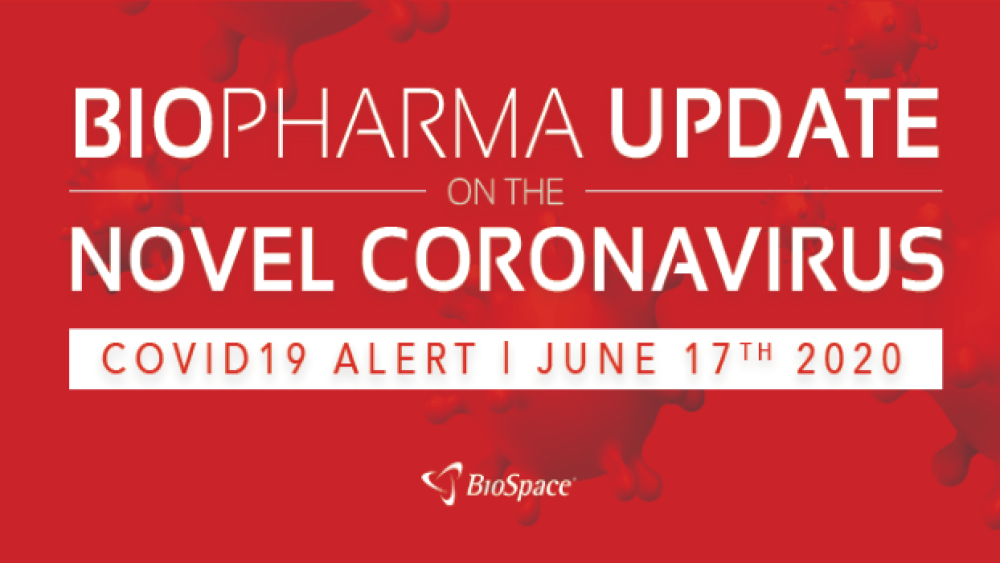Please check out the biopharma industry coronavirus (COVID-19) stories that are trending for June 17, 2020.
News information is not all-inclusive and updates will now be published on Mondays, Wednesdays and Fridays.
FDA Actions
Revoked EUA: On Monday, the FDA revoked a EUA that allowed chloroquine phosphate and hydroxychloroquine sulfate to be used to treat hospitalized patients with COVID-19.
Warning on Remdesivir: The FDA on Monday warned health care providers about a potential drug interaction related to remdesivir which received a EUA for the treatment of COVID-19.
Adverse Event Reporting for Medical Devices: The FDA posted a new web page addressing questions about adverse event reporting for medical devices distributed under EUAs or in COVID-19 related guidance documents.
More COVID-19 Tests: The FDA has moved forward by posting template updates regarding the validation of molecular diagnostic tests to get more tests, quickly to more Americans and making the process easier for developers.
Diagnostics Update: The FDA has worked with more than 400 test developers who have submitted or plan to submit EUA requests to detect COVID-19. Also, 140 individual EUAs have been issued, which include 118 molecular tests, 21 antibody tests and 1 antigen test.
Diagnostics
Due to performance concerns with accuracy, the FDA revoked a EUA for a SARS-CoV-2 antibody test, the Chembio Diagnostic System, Inc. (Chembio) DPP COVID-19 IgM/IgG System.
Testing Therapies, Antivirals and Vaccines
A recent study conducted by researchers at Oxford University showed that low doses of dexamethasone provided to hospitalized patients suffering from the novel coronavirus reduced deaths by about one-third in patients who were on ventilators.
The U.S. Food and Drug Administration (FDA) warned about a newly-discovered potential drug interaction with remdesivir Monday afternoon. The warning came only a few hours after the FDA rescinded Emergency Use Authorization (EUA) for hydroxychloroquine and chloroquine for the treatment of COVID-19.
ViralClear has begun dosing patients in a Phase II study with its antiviral medication against COVID-19. ViralClear’s drug is a broad-spectrum, orally-administered, drug candidate for the treatment of COVID-19 in adult patients. Its anti-viral, known as merimepodib demonstrated decreased viral production of COVID-19 by over 90%, and when combined with Gilead’s remdesivir, to undetectable levels.
Interim results from Germany-based InflaRx shows treatment with its experimental COVID-19 medication IFX-1 showed a trend in lower 28-day all-cause mortality rate, along with trends of maintained kidney function, faster normalization in lymphocyte counts and greater reduction in LDH in patients with severe COVID-19 pneumonia.
PTC Therapeutics will initiate a Phase II/III study to assess PTC299, a dihydroorotate dehydrogenase (DHODH) inhibitor, as a potential treatment for COVID-19. PTC299 is an oral, small molecule tablet that inhibits the cellular enzyme DHODH which is used to produce the RNA building blocks for the production of SARS-CoV-2.
Company Actions
Paris-based Sanofi announced plans to increase its vaccine research and production capabilities. As part of the plan it will invest $679.4 million (€610 million) to create a new production site and a research center, both in France, both dedicated to vaccines including COVID-19.
Cobra Biologics announced it has signed a supply agreement with AstraZeneca to provide GMP manufacture of the COVID-19 vaccine candidate AZD1222.
N.C-based PRA Health Sciences announced the enhancement of its commercial Health Harmony COVID-19 Monitoring Program with the integration of the Microsoft Healthcare Bot service. Users of PRA’s Health Harmony digital platform who enroll in their organization’s COVID-19 Monitoring Program can use the AI-based chatbot, which can recognize and respond to COVID-19-related questions, to enhance their own COVID-19 care.
Immunexpress, Inc. has been awarded a $599,549 grant from the Biomedical Advanced Research and Development Authority (BARDA) to develop the host response sepsis test SeptiCyte RAPID, which has the potential to assess and triage patients with escalating signs of COVID-19 disease.
Cellics Therapeutics published the results showing that its macrophage and pulmonary epithelial nanosponges demonstrated significant neutralization of SARS-CoV-2 infectivity. The results were published in the journal Nano Letters.
AstraZeneca’s chief executive officer, Pascal Soriot, told Belgian radio that the vaccine it is developing with the University of Oxford will likely provide protection against COVID-19 for about a year. The company has also signed contracts with France, Germany, Italy and the Netherlands to supply the EU with up to 400 million doses of the vaccine.
Kamada completed manufacturing of its first batch of plasma-derived IgG for COVID-19. The initial vials are available for compassionate use in Israel. The company has also submitted its Phase I/II trial protocol to the Israeli Ministry of Health with expectations to launch the trial in the third quarter.
Phosphorus, which previously received EUA from the FDA for its at-home COVID-19 saliva test, announced a partnership with BioIQ to make its test more accessible to people across the country.
Other Industry News
According to new data from Signify and Boston University, UV-C light sources may inactivate the virus that causes COVID-19. The results show the virus could no longer be detected after seconds of exposure.
A study published last month in the journal Cell suggests that some people may have immune systems that are better prepared to fight the novel coronavirus than others. Researchers found that certain individuals who have never been exposed to COVID-19 appear to have “helper” T cells that are capable of recognizing and responding to the virus.
Biotech and pharmaceutical companies and health care institutions are on the front lines of not only fighting COVID-19, but working to develop vaccines and therapies against it—often in unexpected ways. Of course, numerous biopharma companies are testing or working to develop drugs and vaccines. But what is a bit unusual is the number of staffers at biotech and pharma companies and health care involved as participants in studies and clinical trials.





